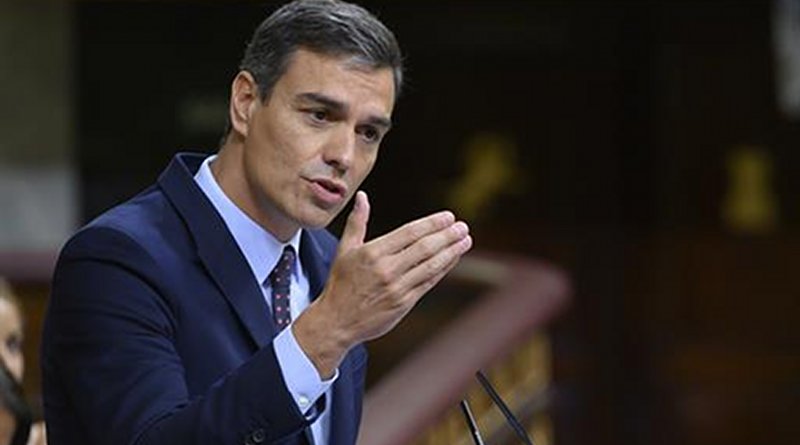Spain: Government Approves 0.9% Pension Rise
Spain’s Prime Minster Pedro Sánchez gave a press briefing after chairing the first meeting of the Council of Ministers of the 14th Legislature to outline the strands of action of the new government and the first agreements it reached. These include the commitment announced in his investiture speech to guarantee the purchasing power of pensioners is maintained and the sustainability of the social protection system.
To this end, the government approved a Royal Decree-Law to increase public pensions by 0.9%, which corresponds to the average estimate of inflation for this year. This increase applies to contributory and non-contributory pensions, and to retired civil servants.
The measure applies retroactively as from 1 January 2020 and will benefit more than 11.1 million pensioners, who will receive the corresponding back-payments for January in their February pension payment.
Sánchez underlined that the legislation approved on Tuesday guarantees that if inflation exceeds the forecast 0.9%, then pensioners will receive a one-off payment before April 2021 corresponding to the difference with the Consumer Price Index (CPI). “This guarantees pension increases and the recovery of the purchasing power of this country’s pensioners as one of the commitments signed between the Socialist Party and Unidas Podemos in our progressive coalition agreement”, he claimed.
Pedro Sánchez stated that this measure will correct the ceiling of 0.25% adopted in the past, which meant the loss of the purchasing power of pensioners. He also recalled that “this mechanism was imposed outside of the Toledo Pact”.
Sustainability of pensions
Sánchez called for consensus and for broad-based agreements to be reached to guarantee the future of pensions. In this regard, he stressed that the government will stretch out its hand to all the political and social forces to renew the Toledo Pact and “work to adopt fair and balanced measures that help enhance protection for pensioners”.
This task will be made compatible with meeting the commitments taken on with the European Union on budget stability, he specified.
Pillars of government action
Sánchez stated that “Spain must make up lost ground and have a government that works”. In this regard, he conveyed to his Cabinet the need to get behind a government that is decisive, executive and pro-active. “We want to be a government of action that has come to power to implement effective and useful policies”.
The five transformations that will guide the government’s actions are, firstly, to ensure that the economy enjoys sound growth based on far more productive and competitive pillars such as science and innovation, and for this to generate quality jobs.
Sánchez also announced that territorial dialogue must be boosted, tensions overcome and the maximum balance achieved to provide a response to the demographic challenge through the State of the Autonomies, the decentralised State and local authorities.
It is also necessary to reduce social inequalities, respond to the climate emergency with an ecological transition that must be just and, furthermore, ensure full equality between men and women and eradicate any form of discrimination.
In order to achieve these goals, Sánchez sent the members of the Cabinet a personal letter requesting them to combine this desire to take action with a will to dialogue. “There is nothing more progressive than uniting the country and employing dialogue to push through many things that Spanish society needs”, he stressed.
Legislature of dialogue
Sánchez explained that the government will maintain an “open and receptive” attitude to proposals made by parliamentary groups in the Lower House of Parliament and considered that on many matters there are not insurmountable differences to achieving a consensus with the opposition forces.
Accordingly he expressed his intention to “reach out” to them to ensure the renewal of such fundamental institutions as the General Council of the Judiciary, the Constitutional Court and the Ombudsman, and called for a constructive attitude and a sense of State from them. When asked about the candidature of the former Minister for Justice, Dolores Delgado, to the position of Attorney General, Pedro Sánchez stated that her “CV and impeccable track-record as a public prosecutor” are beyond all doubt.
Pedro Sánchez also stressed the need for social dialogue in order to negotiate the new Toledo Pact and increase the minimum wage (Spanish acronym: SMI) to 60% of the average wage in this term of office, as set out in the European Social Charter.
Sánchez also called for territorial dialogue, and advocated normalising and streamlining the debate on Catalonia by moving away from judicial channels and searching for a political solution. Pedro Sánchez stated that should a referendum be held, it is because an agreement has been reached, and reiterated his interest in working to achieve that within “the bounds of the Spanish Constitution”.
Pedro Sánchez confirmed that he will meet with the President of the Regional Government of Catalonia, Joaquim Torra, at the latter’s request.

